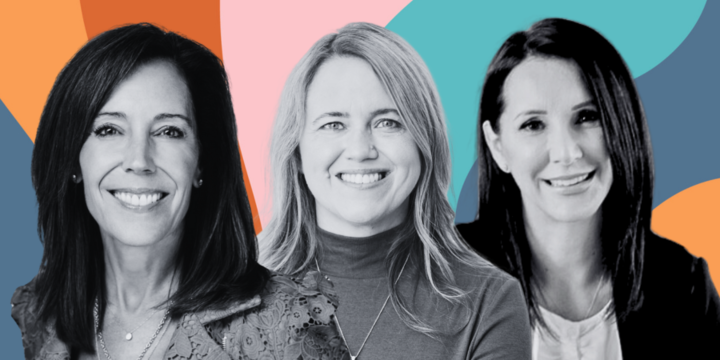On March 8, International Women’s Day is recognized around the world, celebrating the social, economic, cultural, and political achievements of women. The day is a call to action for accelerating women’s equality which, despite significant progress, demands continued, collaborative effort.
For an article for Healthing.ca, journalist Angelica Bottaro spoke to leaders from WHCC founding foundations about how we can work together to provide better healthcare and equity for women within the healthcare system.
According to data recently collected in the United States, as many as 80 percent of women healthcare workers and 20 percent of patients have experienced some form of discrimination from the healthcare system.
Bottaro asked the three CEOs of WHCC’s founding foundations — Sharlene Rutherford, President & CEO, Alberta Women’s Health Foundation; Leslie McCarley, President & CEO, Women’s College Hospital Foundation, and; Cally Wesson, President & CEO, BC Women’s Health Foundation — about the work of WHCC, why investing in women is so important, and what we can do about it. Read their responses below.
What biases do you think exist in the health research space that make it more difficult for women to access health information based on evidence-backed research?
A woman can make all the right decisions about her health and still be betrayed at her doctor’s office or in the emergency department. Gender bias in health exists—not out of malice but a combination of pervasive old habits by some in the medical community and an historic lack of knowledge, generally, about women’s health. The result is female patients continue to be misdiagnosed, neglected, dismissed as complainers, accused of being overanxious, mislabeled as depressed, or told their symptoms are all in their heads.
The result is limited specialist knowledge and treatment options across a broad range of conditions impacting women and, moreover, have resulted in many women’s health issues being considered taboo. The wide-sweeping societal impacts of keeping women’s health issues taboo are extensively covered in a 2022 thought leadership paper by the Alberta Women’s Health Foundation titled Surveying the Silence and remains a must-read for everyone.
— Sharlene Rutherford, CEO, Royal Alexandra Hospital Foundation
Why do you think inclusivity in research is so important and what do you think are the steps forward in terms of improving research into women’s health?
There is a gap in Canadian healthcare that women have long been falling through—and we need to be there to prevent these omissions and bolster their care. Women’s College Hospital provides informed, excellent, and inclusive care that caters to the unique needs of women—who are the backbones of their communities and families.
Inclusivity in healthcare goes beyond just access to care, encapsulating inclusion in research, education, advocacy, and community—which is our aim through Women’s College Hospital Foundation and Women’s Health Collective Canada. Women make up 51% of the population, yet only 7% of health research funding nationally focuses on their specific needs. We are working to change that.
— Leslie McCarley, CEO, Women’s College Hospital Foundation
What barriers do you see women face in the healthcare system and what do you think are the steps forward in terms of improving research into women’s health?
Women’s health is unique. There are significant differences in how women and men experience health conditions. However, the scientific research guiding medical practices has historically overlooked the crucial impacts of sex and gender in prevention, diagnosis, and treatment. Furthermore, researchers with ground-breaking ideas for advancing women’s health often face barriers in securing initial funding, thus halting their progress.
This is why BC Women’s Health Foundation is launching Women’s Health Research Month, our annual effort to raise funds that support high-quality, high-impact research that produces innovative treatment and increased access to healthcare for women. An investment in women’s health research is a step towards new evidence-based solutions that can inform and transform the health and healthcare of all women.
— Cally Wesson, CEO, BC Women’s Health Foundation
WHCC Celebrates Women’s History Month
This Women’s History Month, WHCC founding foundations hosted several events that shared the common goal of closing the health research gap. See some highlights below.
Alberta Women’s Health Foundation launched the “Inspire Inclusion” campaign with Alberta Blue Cross to “raise awareness of the gaps that continue to exist in women’s health.” The campaign calls for us to “collectively forge a more inclusive world for women.” AWHF also announced new dates for their lecture series “Between Us: Exploring The Mind & Body.” Find out more details here, including information on upcoming discussions.
BC Women’s Health Foundation is devoting the full month of March to women’s health research. Throughout “Women’s Health Research Month,” BCWHF will showcase ground-breaking research in the field, and also highlight the need for more funding. On March 1, the month kicked off with the annual event Illuminations Luncheon presented by RBC Wealth Management, featuring a keynote from Hayley Wickenheiser and a fireside chat featuring Dr. Gina Ogilvie, Dr. Gillian Hanley, and Dr. Wendy Norman.
On March 7, Women’s College Hospital Foundation hosted its annual Women for Women’s Luncheon event. The event connects “champions of women’s health and health equity across Canada in support of the mission and vision of Women’s College Hospital.” The event, which included talks on “The Facts and Fiction of Menopause” and “Rethinking, and Relieving, Chronic Pain,” raised $900,000 to support the work of the hospital.
As part of its seminar series, on March 1, the Partnership for Women’s Health Research Canada hosted “Digital Innovations: Expanding women’s informed choice and access to quality healthcare”. This series seeks to “explore research that is driving advances in healthcare for women, trans and non-binary people.” See the panel here.
